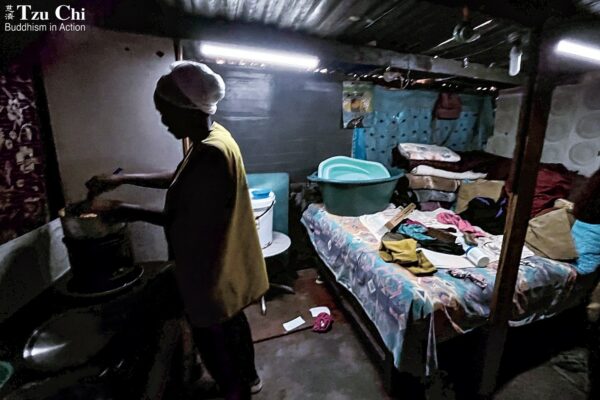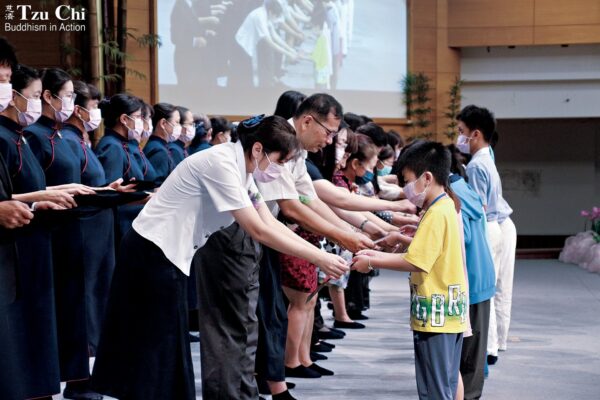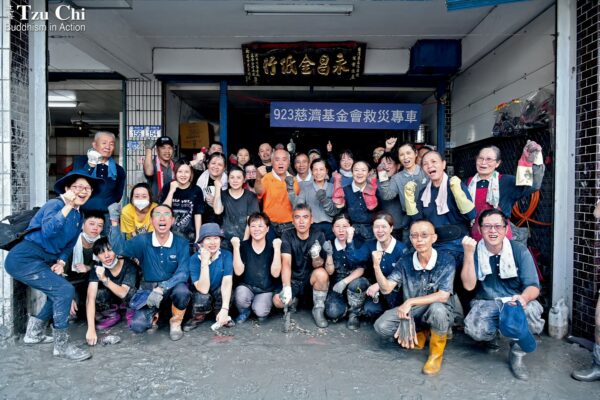By Hong Jing-jing
Translated by Wu Hsiao-ting
Photos by Huang Xiao-zhe
Aromatherapy volunteer Li Yu-jin uses essential oils and massages to ease the anxiety of terminal patients and provide them with a sense of care and comfort.
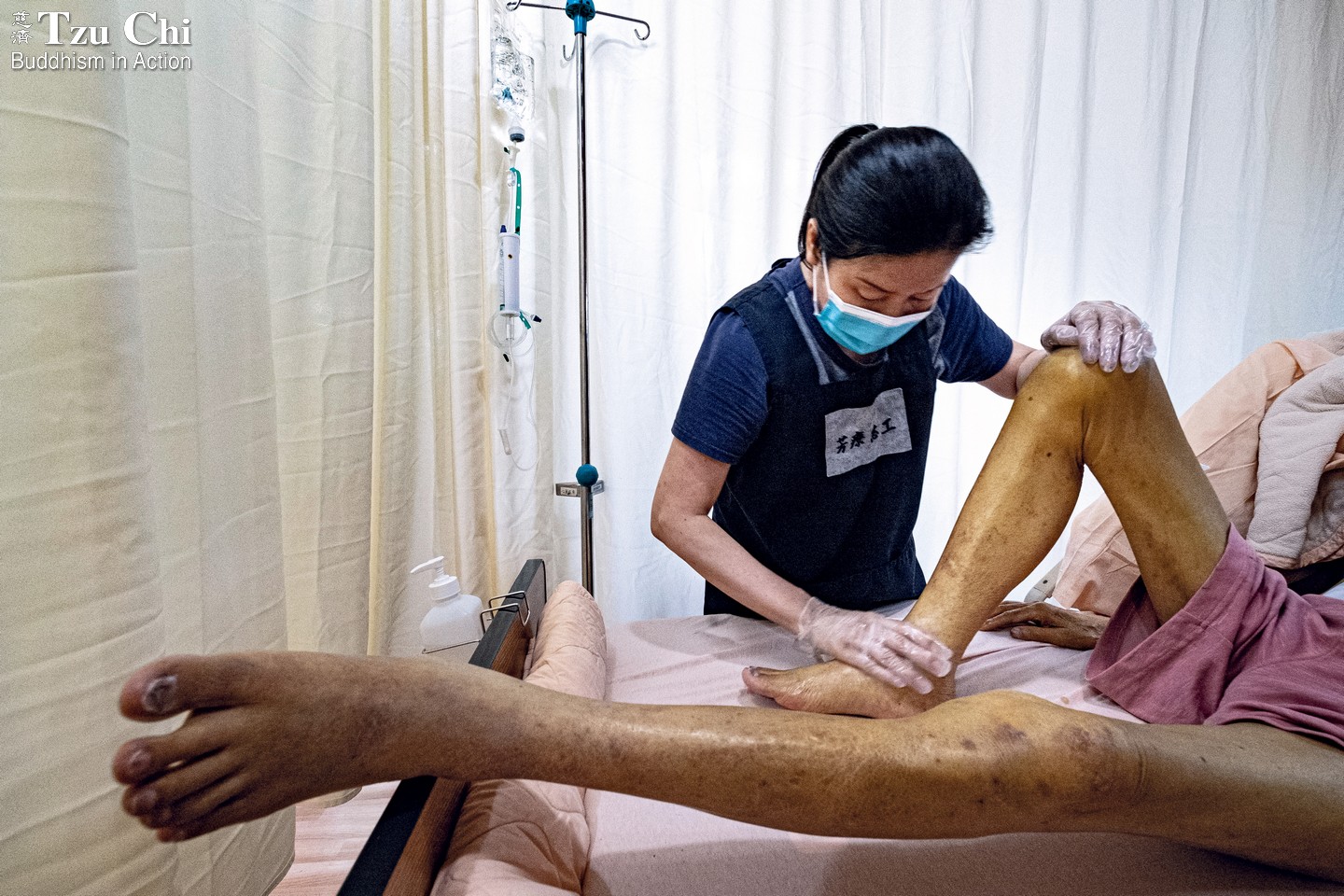
Chen Jing-wei drives his wheelchair to his next class. Finishing his college education is one of his dreams. Every day that brings him closer to the fulfillment of his dreams is a beautiful day for him.
Mrs. A had spent six days in the palliative care ward at Taichung Tzu Chi Hospital in central Taiwan. Cancer cells had metastasized to her brain, lungs, liver, and abdominal cavity, resulting in symptoms of pain, shortness of breath, nausea, and vomiting. Her emotions were unsettled, characterized by fear, depression, and irritability. She had also started experiencing delirium, confusion, loud outbursts, and difficulty sleeping. Her husband, who was by her side as her caregiver, was also grappling with sleeplessness due to worry and anxiety.
Aromatherapy volunteer Li Yu-jin (李玉錦) entered Mrs. A’s room with a blend of essential oils. Greeting the patient, she said, “I’ll give you a massage; it’ll be very soothing. Don’t be afraid!” In just over ten minutes, Mrs. A peacefully fell asleep. Li continued to massage her swollen and stiff lower limbs.
Through the calming aroma of essential oils and comforting massages, Li communicates abundant love and warmth to patients, alleviating their fear and anxiety and providing compassionate support on their final journey. She shared, “Many people ask me, ‘Aren’t you afraid to provide aromatherapy massages for terminally ill patients?’ I tell them, ‘You wouldn’t be afraid of your own family member in that situation, right? I’m not afraid because I treat every patient as my own family.’”
She explained that she had been volunteering in hospice care for 20 years, and the essential oils she used came from the kindness of the public’s donations. “Everyone contributes what they can to support the patients,” she said. Upon hearing this, Mrs. A’s husband immediately expressed his desire to donate as well.
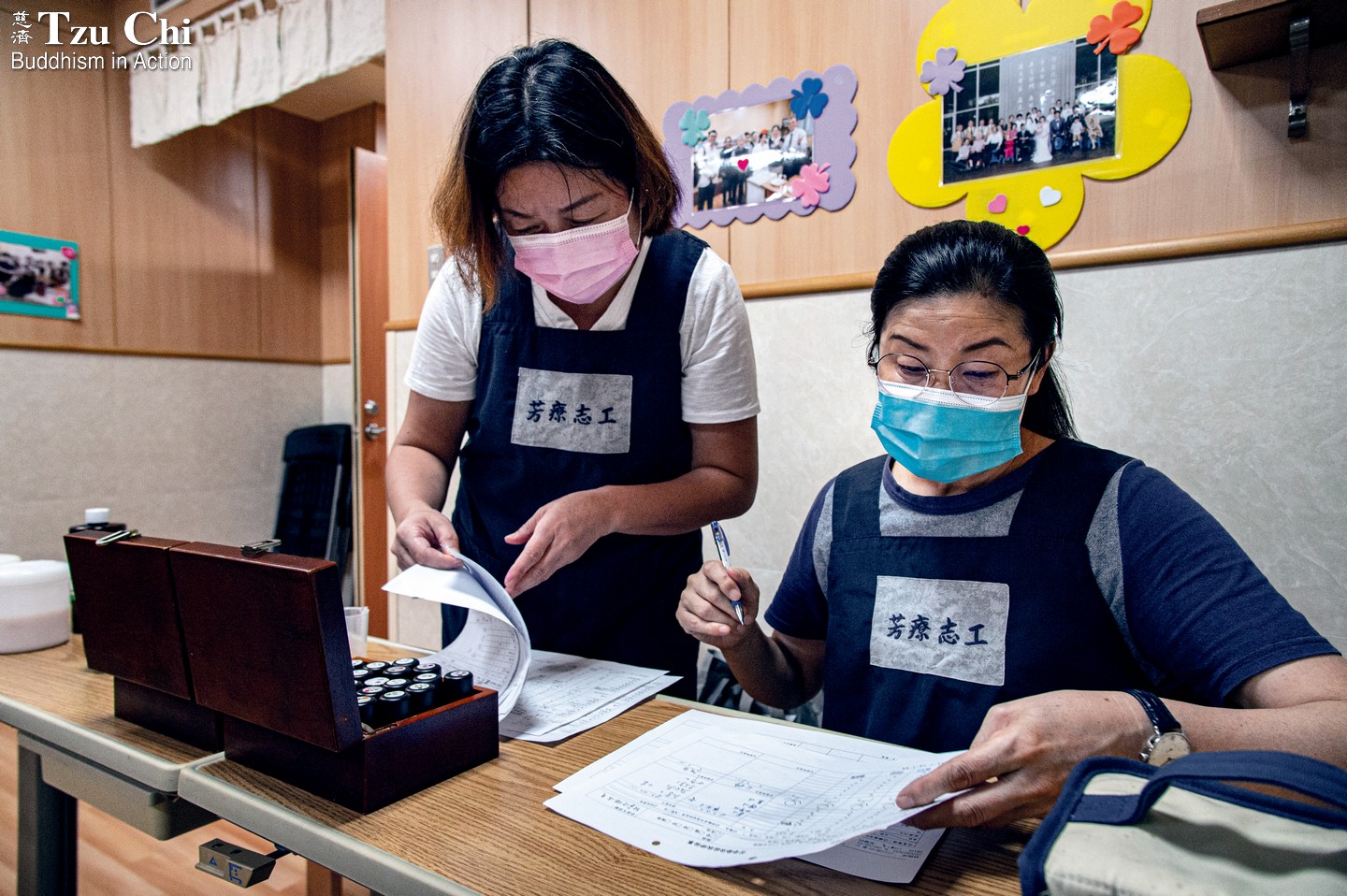
Li Yu-jin (right) examines the records of patients who are open to aromatherapy before prescribing individualized essential oil formulas for them.
An aromatherapy volunteer prepares essential oil blends based on formulas prescribed by Li Yu-jin.
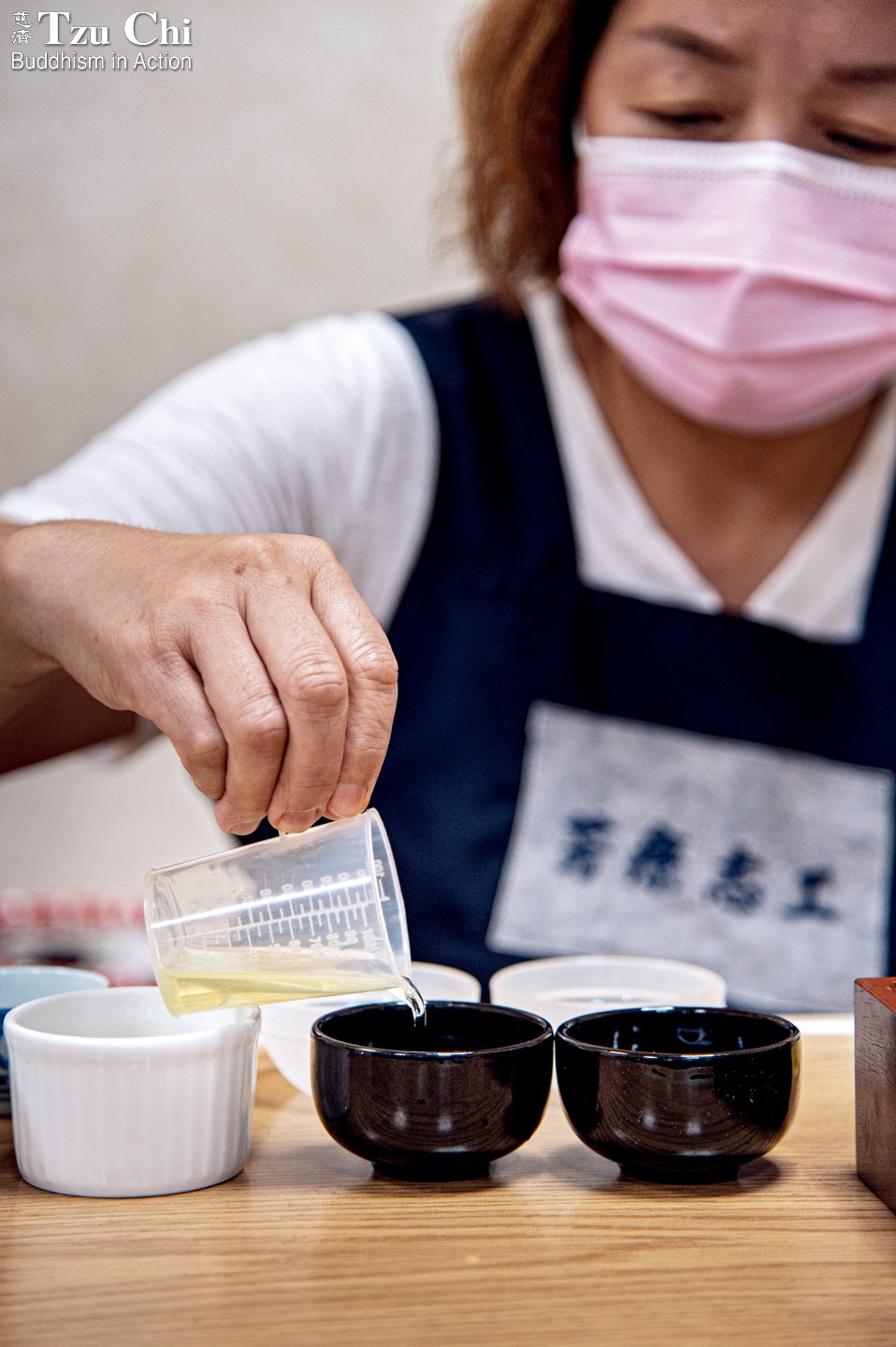
Magical fingers
Li was introduced to the world of essential oils at the age of 33. While attending classes offered by an aromatherapy association, she discovered that essential oils were already widely used in clinical settings overseas, effectively relieving various discomforts. Inspired, she thought, “Essential oils are so beneficial; I can use them to help those in need.”
At first, Li joined instructors from the aromatherapy association in offering services to hospital palliative care wards. Now, she regularly volunteers every Wednesday at China Medical University Hospital in central Taiwan and every other Wednesday at Taichung Tzu Chi Hospital. She seldom takes a day off, doing so only when she has exams or needs to travel abroad.
Li encountered Ms. B, a patient at Taichung Tzu Chi Hospital. “I never expected massages to be this effective,” Ms. B said over and over. A radiant smile had graced her face since the massage session provided by Li began, a stark contrast to the fact that she was a critically ill patient with salivary gland cancer that had spread to her lungs. When she talked, she opened up and seemed to momentarily forget about her illness. “I sell pineapples and green foxtail at the market—all grown by my family! I also sell ginger.”
She continued, “Some say that once you check into a palliative care ward, there’s no hope or that it’s time to settle affairs. But I still hold onto a glimmer of hope. Taking medication and injections every day, my wish is to return home one day.”
Huang Mei-ling (黃美玲), the head nurse of the palliative care ward at Taichung Tzu Chi Hospital, said that a common characteristic of end-stage cancer patients is neglecting self-care. Massage can promote relaxation and comfort, allowing them to feel loved and cared for. “Li’s fingers work wonders,” Huang added. “She can sense the issues or emotions of a patient. The happy smile on many patients she has massaged shows the profound enjoyment they experienced. Some even open up emotionally, especially breast cancer patients, who release many hidden emotions.”
Liu Jia-yi (劉䕒儀), another aromatherapy volunteer, shared that she joined in the services after discovering a severe shortage of such volunteers while she was serving at the information desk of China Medical University Hospital five or six years ago. The hospital had been seeking aromatherapy volunteers for its palliative care unit, but without much success. For a long time, Li Yu-jin was the only volunteer holding an aromatherapist certificate. Liu decided to sign up and began learning alongside Li.
Liu reflected on her initial shock and fear when seeing patients with deformed facial features and ulcerated lesions due to head and neck cancers. She said, “Li remained calm, so I gradually overcame my fear by following her lead.”
As it happens, Liu’s mother fell victim to terminal cancer too. It was only four short months from her diagnosis to her passing. During that time, severe abdominal fluid retention prevented her from walking. Liu asked Li to create an essential oil formula for her mom and personally massaged her every day. She went on, “I never imagined that one day I would be helping my own mother with my skills as an aromatherapy volunteer.”
One day, Li said to Liu, “I want to see your mother.” Despite the challenges posed by the COVID-19 pandemic, Li visited Liu’s mother, providing a massage and chatting with her. Liu recalled her mom’s reaction to Li’s visit. “My mom was very happy that day. It had been a long time since I saw her smile. She said it felt so good and praised Li, saying that she massaged better than I did!”
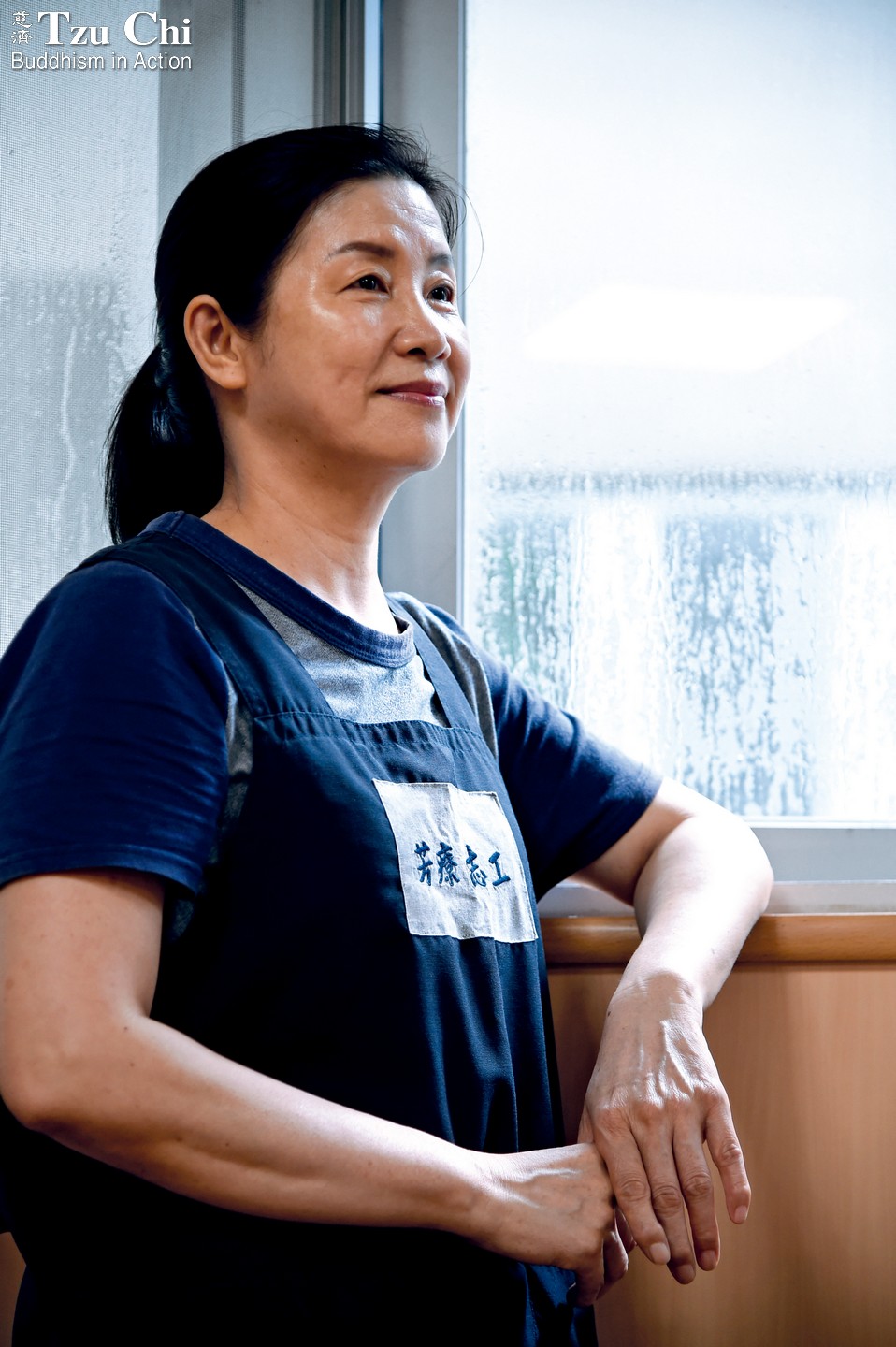
Li Yu-jin, a dedicated aromatherapy volunteer, plans to continue in her role for as long as she has the physical strength, even into old age.
Expressing love through touch
When visiting a hospital ward, Li Yu-jin pays special attention to patients without family by them to provide care. On one occasion, she met an elderly woman who had to skip bathing because she had no one to help her. Despite the challenging sanitary conditions the woman presented, Li gave the woman full-body massages. She kept going even when she kneaded out small particles of grime during the process.
The elderly woman tearfully confided, “My family avoids me, fearing I’ll infect them. Yet, you help me without wearing gloves; you touch me directly.” Li typically refrains from using gloves during massages, emphasizing, “I can simply wash my hands afterward. The essence of a massage is the comforting feeling of touch; I only wear gloves if there are lesions on my hands.”
While family members may not be able to share a patient’s physical pain, helping them learn to express their care through touch remains profoundly meaningful. “Upon entering a room,” Li said, “I always inquire, ‘What’s your relationship with the patient?’ If they are a son or daughter, I say, ‘Come, let’s repay your parent’s kindness. I’ll teach you how to massage.’”
Li has bid farewell to over a thousand patients over the past two decades. She maintains her composure when confronting death. For example, recently she was helping a patient who was struggling to breathe. Li realized the patient didn’t have much time left, and so told the patient’s daughter, “I’ll massage half, and you can do the other half.” The patient passed away shortly after the massage. Li calmly extended her blessings, remarking, “For him, in such pain, passing away was a relief. Therefore, I calmly wished him to rest in peace.”
A man in his 40s, battling connective tissue cancer, had developed tumors, large and small, on his thighs. Because the man’s tumors gave off a foul odor, other patients avoided sharing a room with him, leading to his confinement in a single room. Clearly depressed, he intentionally covered himself with a blanket to contain the smell and avoided interactions with others.
Wearing two masks with essential oil dropped onto them, Li entered the man’s room composedly. She aimed to sterilize and reduce inflammation of his legs using a blend of citrus oils, cedarwood, lavender, and lemon. Due to her efforts, the unpleasant odor in the room subsided after a week. “This young man continued to stay silent,” she said, “but he no longer hid beneath his blanket and shunned others. Knowing that aromatherapy can help people like this brings the greatest comfort to me.”
Simultaneously managing her aromatherapy practice, preparing for professional exams, and volunteering is no easy task. Yet, Li’s initial aspirations and unwavering dedication fuel her passion, driving her continuous efforts. Whenever fatigue sets in and she feels on the brink of being unable to carry on, she reflects on her initial motivation. “Being an aromatherapy volunteer is my personal aspiration. If I quit, who will create essential oil formulas for the patients? Many patients say, ‘We’ve been waiting for you; why haven’t you come?’ Just thinking about this instantly renews my energy.”
Li Yu-jin and her three fellow aromatherapy volunteers, all in their 50s, are eager to involve the younger generation. She said, “I can’t predict how long I can keep going. I’m just doing my best now, serving patients the best I can and hoping to teach my skills and knowledge to more people. I want to continue this journey into old age. I hope I have the physical strength.”
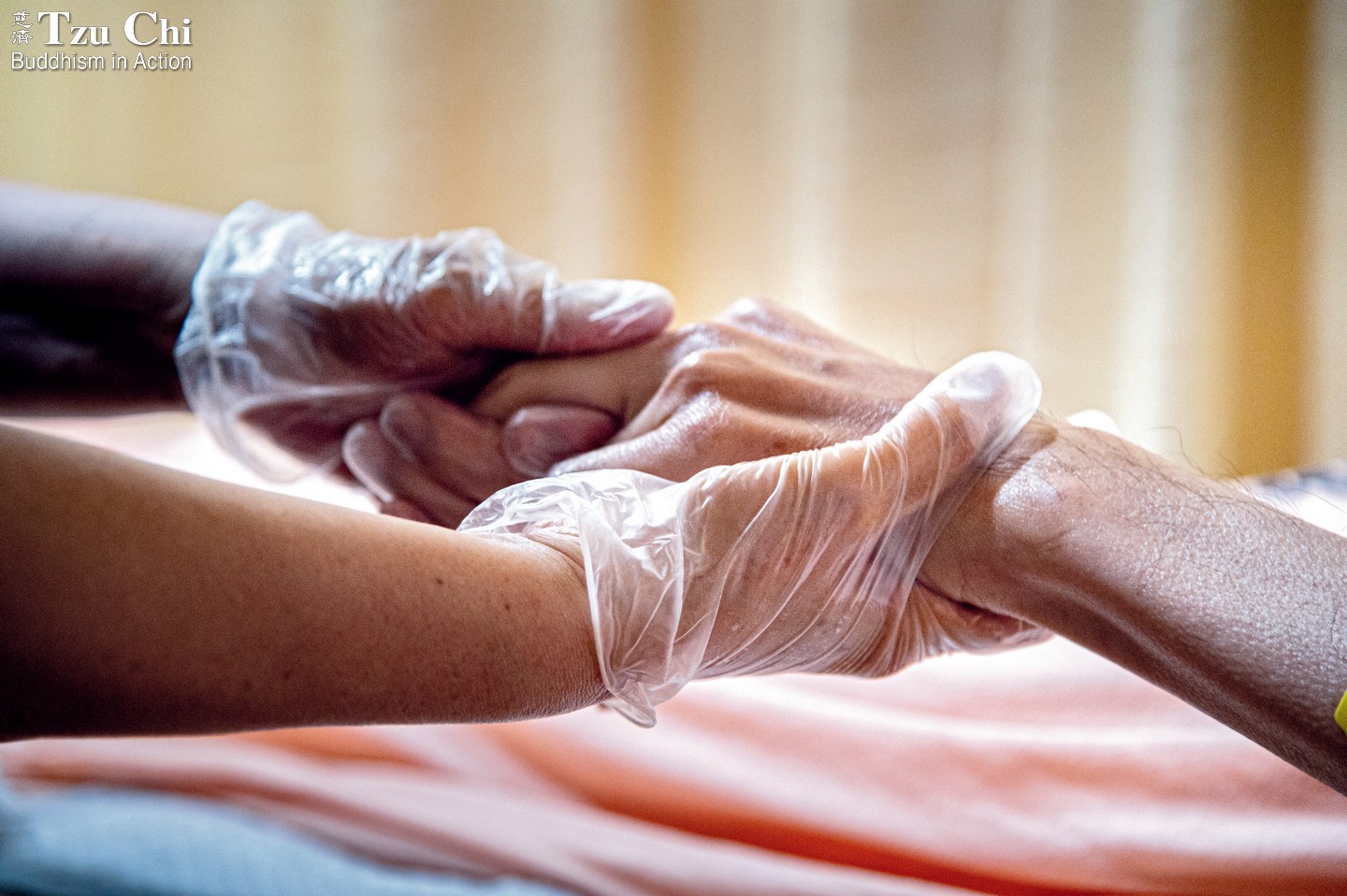
Li Yu-jin wears gloves only when her hands have wounds. She hopes to use the soothing touch of essential oil massage to transmit positive, loving energy to patients.

